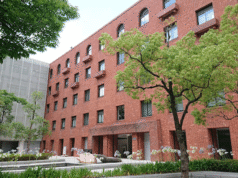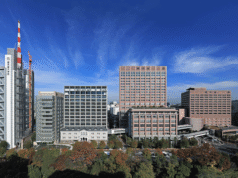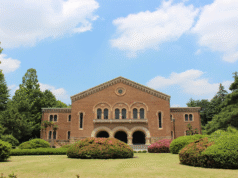Kumamoto University, Japan: A Comprehensive Overview
Introduction
Kumamoto University (KU), established in 1949, stands as a distinguished national university in Kumamoto City, Kyushu, Japan. With a rich history rooted in several educational institutions dating back to 1874, KU has evolved into a comprehensive university renowned for its academic excellence, research contributions, and international collaborations. This article delves into the establishment, history, affiliations, academic offerings, facilities, and various facets that define Kumamoto University.(The Japan Times)
Establishment and Historical Background
- Founding Year: 1949
- Predecessor Institutions:
- Kumamoto Teachers College (established in 1874)
- Kumamoto Pharmaceutical College (1885)
- The Fifth High School (1887)
- Kumamoto Medical College (1896)
- Kumamoto Technical College (1906)(Wikipedia)
These institutions were merged to form Kumamoto University under the post-war educational reforms. The university’s origins trace back to the Meiji era, reflecting a long-standing commitment to higher education in the region.(Wikipedia)
Affiliations and Global Collaborations
- National University Corporation: Since 2004, KU operates as a National University Corporation under the National University Corporation Law.
- International Partnerships: KU has established partnerships with over 275 institutions across 53 countries, fostering global academic exchange and research collaborations.
- MEXT Projects:
- Program for Promoting the Enhancement of Research Universities
- Top Global University Project
- Program for Enhancing Employment of International Students(Wikipedia, Kumamoto University)
Academic Offerings
Undergraduate Faculties
- Faculty of Letters
- Faculty of Education
- Faculty of Law
- Faculty of Science
- Faculty of Medicine
- School of Pharmacy
- Faculty of Engineering
Graduate Schools
- Graduate School of Education
- Graduate School of Social and Cultural Sciences
- Graduate School of Science and Technology
- Graduate School of Law
- Graduate School of Life Sciences
- Graduate School of Medical Sciences
- Graduate School of Pharmaceutical Sciences
- Graduate School of Health Sciences
These faculties and graduate schools offer a wide range of programs catering to diverse academic interests and research pursuits.
Campus Facilities
Kurokami North Campus
- Departments: Faculty of Letters, Faculty of Education, Faculty of Law
- Graduate Schools: Graduate School of Education, Graduate School of Social and Cultural Sciences, School of Law
- Centers and Institutes: The Memorial Museum of The Fifth High School, Research Center for Higher Education(Wikipedia)
Kurokami South Campus
- Departments: Faculty of Science, Faculty of Engineering
- Graduate School: Graduate School of Science and Technology
- Centers and Institutes: Institute of Pulsed Power Science, Magnesium Research Center(Wikipedia)
Honjo-Kuhonji Campus
- Department: Faculty of Medicine
- Graduate Schools: Graduate School of Medical Sciences, Graduate School of Health Sciences
- Centers and Institutes: Institute of Molecular Embryology and Genetics, Center for AIDS Research(Wikipedia, Wikipedia)
Oe Campus
- Department: School of Pharmacy
- Graduate Schools: Graduate School of Pharmaceutical Sciences, Graduate School of Health Sciences
- Centers and Institutes: Institute of Resource Development and Analysis(Wikipedia)
These campuses are equipped with state-of-the-art facilities, libraries, research centers, and student support services, providing an enriching environment for academic and personal growth.
Research Activities
Kumamoto University is at the forefront of research in various fields, with numerous research centers and institutes dedicated to advancing knowledge and innovation. Notable research areas include:
- Infectious Diseases and Regenerative Medicine: Courses like the “Course of Educational Program for Advanced Research in Infectious Diseases and Regenerative Medicine” are offered to address global health challenges.
- Pulsed Power Science: The Institute of Pulsed Power Science conducts cutting-edge research in energy and power technologies.
- Magnesium Research: The Magnesium Research Center focuses on materials science and engineering applications.
- Environmental and Life Sciences: Institutes like the Institute of Molecular Embryology and Genetics contribute to advancements in biology and environmental studies.(Kumamoto University)
KU’s commitment to research excellence is evident in its extensive infrastructure and collaborative initiatives with global institutions.(Kumamoto University)
Scholarships and Fellowships
Kumamoto University offers a variety of scholarships and fellowships to support both domestic and international students. These financial aids aim to alleviate the cost of education and encourage academic excellence. Specific details about available scholarships can be obtained through the university’s official channels.
Notable Alumni
Kumamoto University boasts a distinguished list of alumni who have made significant contributions in various fields:
- Hiroaki Mitsuya: Virologist known for his role in the discovery of the anti-HIV drug zidovudine (AZT).
- Yasuhiro Muramatsu: Medical scientist recognized for his work in cancer research.
- Kenichiro Aoki: Earth scientist with notable achievements in environmental studies.
- Chuhei Takashima: Archaeologist contributing to the understanding of Japanese history.
- Masazumi Harada: Researcher of Minamata disease, focusing on environmental health.
- Takeshi Yamakawa: Researcher in fuzzy logic, aiding in technological advancements.
- Meng Yonggang: Tribologist and director at Tsinghua University’s State Key Laboratory of Tribology.(Wikipedia)
These individuals exemplify the diverse and impactful careers fostered by KU’s educational programs.
Reputation, Rankings, and Awards
Kumamoto University is recognized both nationally and internationally for its academic and research excellence:
- National Recognition: KU is considered one of Japan’s oldest and most prestigious national universities, with a strong emphasis on research and education.
- International Collaborations: The university’s involvement in global projects, such as the Top Global University Project, highlights its commitment to internationalization.
- Awards and Honors: KU has received various accolades for its contributions to science, technology, and education. Specific awards can be detailed through the university’s official records.(ST Office Tokyo – CH, Wikipedia)
Address and Contact Details
- Kurokami North Campus: 2-40-1, Kurokami, Chuo-ku, Kumamoto
- Kurokami South Campus: 2-39-1, Kurokami, Chuo-ku, Kumamoto
- Honjo-Kuhonji Campus: 1-1-1, Honjo, Chuo-ku, Kumamoto
- Oe Campus: 5-1, Oehonmachi, Chuo-ku, Kumamoto
- Official Website: https://www.kumamoto-u.ac.jp/(Wikipedia)
Conclusion
Kumamoto University stands as a beacon of higher education in Japan, with a rich history, diverse academic offerings, and a commitment to research and international collaboration. Its comprehensive facilities, distinguished alumni, and global partnerships underscore its status as a leading institution in the academic world. For prospective students and researchers, KU offers a dynamic environment conducive to academic and professional growth.
Kumamoto University undergraduate courses, KU Japan graduate programs, study medicine and pharmacy Japan, Kumamoto University research centers, scholarships for international students Japan, KU career development programs, study science and engineering Japan, Kumamoto University notable alumni, KU campus life experience, Japanese national university programs














